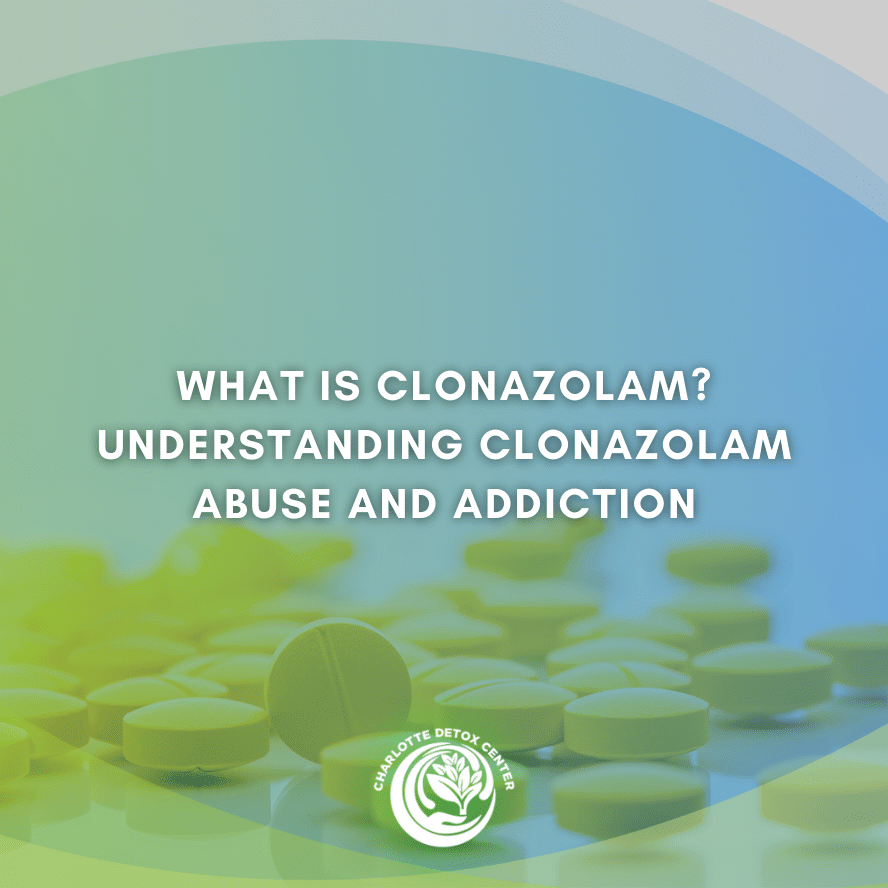What is Clonazolam? Understanding Clonazolam Abuse and Addiction

Medically Verified: 2/1/24
Medical Reviewer
Chief Editor

All of the information on this page has been reviewed and verified by a certified addiction professional.
Benzodiazepines are a class of drugs primarily used to treat anxiety and seizures. While these medications are highly effective when used short-term, they are also known to be habit-forming and addictive. There are several different types of benzodiazepine medications, with a few of them no longer being used medicinally in the United States.
One of the benzodiazepine medications that is not approved for medicinal use is called clonazolam (triazolobenzodiazepine).[1] Clonazolam is a combination of two different benzodiazepine drugs: clonazepam and alprazolam. It is a highly potent substance that can cause sedation and amnesia even in small doses.
Unfortunately, many people abuse clonazolam and become addicted to it. Clonazolam abuse and addiction can lead to physical dependence, withdrawal seizures, and other dangers that require professional treatment.
What are the Effects of Clonazolam?
Because clonazolam is not approved for medicinal use, people access this drug through illicit retailers, often online. Clonazolam produces similar effects to other benzodiazepines like Xanax, however, it is over two times more potent.[2] Taking over half a milligram of this substance could result in a fatal overdose.
When someone consumes clonazolam, it’s common to experience significant amnesia. They may wake up the next morning having no idea what went on other than hazy memories of uninhibited behaviors. This is part of what makes the abuse of this substance so dangerous, as people lose track of time and behave in atypical ways.
Common effects of clonazolam include:[2]
- Heavy sedation
- Hypnosis
- Long-lasting amnesia
- Reduced anxiety
- Euphoria
- Loss of control over behavior
- The rapid development of tolerance
- Addiction
People who are addicted to clonazolam should never attempt to stop taking it on their own. The withdrawal symptoms associated with this substance can be severe and life-threatening without proper medical treatment.
Why is Clonazolam Abuse and Addiction Dangerous?
Clonazolam is often described as a designer drug because it is a synthetic analog of benzodiazepines. Its use is restricted in the United States because of how strong and dangerous it is, so obtaining or consuming it is illegal.
Potential dangers associated with clonazolam abuse include:
Addiction
The most commonly abused benzodiazepine medications are , , Ativan, and Klonopin. These medications are habit-forming and highly addictive, often causing people to suffer from severe substance use disorders.
Clonazolam is two times more potent than other benzodiazepine drugs. If less potent forms of benzodiazepines are highly addictive, clonazolam is an incredibly addictive and dangerous substance.
Once you become addicted to clonazolam, you are at risk of an array of unfortunate circumstances. An addiction to this drug can be life-threatening for several reasons, including accidental overdoses, poor judgment, severe withdrawal symptoms, and more.
Impaired Judgment
Because clonazolam can cause impaired judgment, abusing it can lead to a loss of coordination and motor control, so people who abuse it could suffer from accidental falls, slowed reflexes, and an inability to think clearly.
An inability to think clearly could cause you to make poor choices, such as driving while under the influence of clonazolam. Pair this with slowed reflexes and sedation, and people could get into fatal car accidents and more.
Overdose
Because clonazolam is so potent, overdose is a significant risk to consider. The risk of overdosing becomes much higher if the drug is snorted or taken in liquid form. Snorting clonazolam can enhance the effects, leading to blackouts and intoxication that lasts for several days.[3]
Signs of a benzodiazepine overdose include:[4]
- Confusion
- Coordination issues
- Slurred speech
- Drowsiness
- Nausea
- Reduced respiratory rates
- Coma
- Death
If you suspect someone you love is overdosing on clonazolam, contact emergency medical services immediately.
Long-Term Damage
Long-term use of any benzodiazepine can lead to damage to the brain. For example, people can develop depression, anxiety, impaired memory, and significant cognitive issues because of the way benzodiazepines affect certain areas of the brain.
Studies have found that “benzodiazepines bind to a specific protein, the translocator protein (TSPO), on the surface of cell organelles of the microglia. This binding activates the microglia, which then degrade and recycle synapses—that is, the connections between nerve cells.”[5]
Find Help for Clonazolam Abuse and Addiction Today
Detoxing from clonazolam can result in severe symptoms and life-threatening seizures, so you should never attempt to do so on your own. Medical detox centers like Charlotte Detox Center can help you safe and comfortable until your body adjusts to functioning without the drug.
At Charlotte Detox Center, our licensed drug detox facility in Charlotte, NC is designed to help you begin your addiction treatment while supporting you through the potential struggles of drug abuse withdrawal symptoms. Contact us today to get started or learn more.
References:
- https://www.regulations.gov/document/FDA-2020-N-1680-0001
- https://pubmed.ncbi.nlm.nih.gov/35997362/
- https://www.who.int/docs/default-source/controlled-substances/43rd-ecdd/final-clonazolam-a.pdf?sfvrsn=b8b10967_4
- https://www.ncbi.nlm.nih.gov/books/NBK482238/
- https://neurosciencenews.com/cognition-benzodiazepine-20141/
